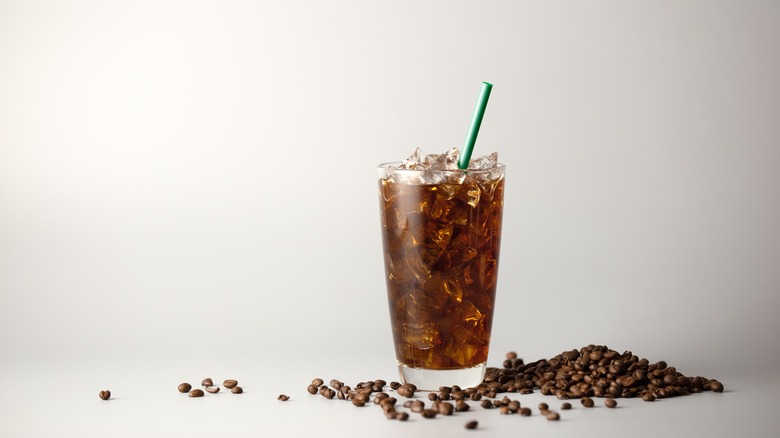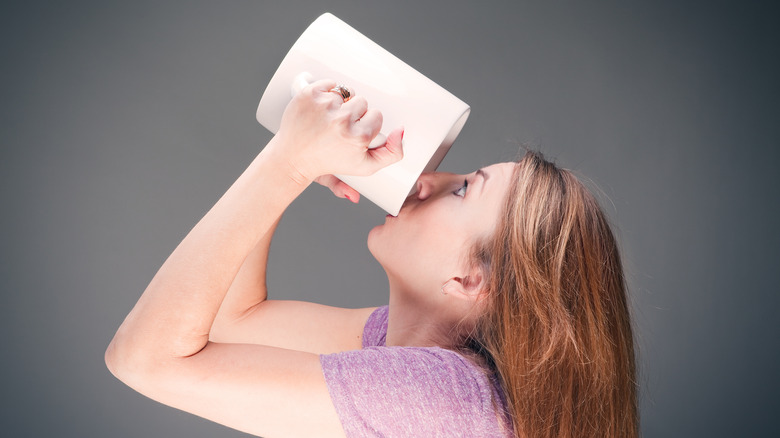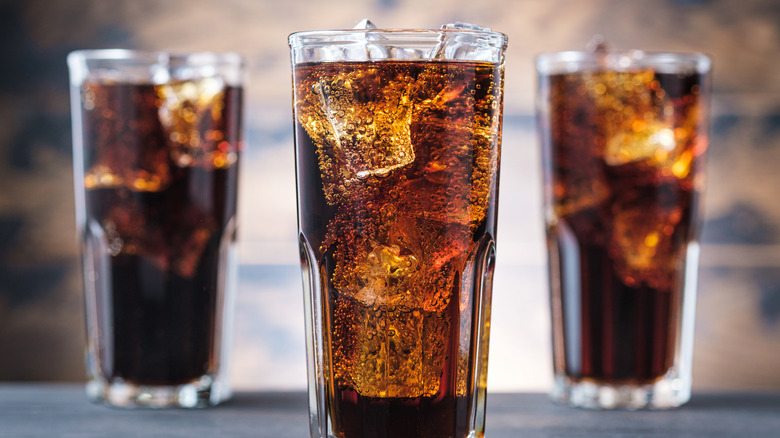Caffeinated Drinks Won't Actually Kill Your Hydration
Tea, coffee, and energy drinks are saviors when you need to wake up in the morning or get a quick afternoon pick-me-up. But, for all the energy-boosting benefits of caffeine, it's been long believed that there's a cost to pay: a heavy tax on hydration. However, that's not always the case.
First, it might be good to understand the inner workings of caffeine. It's considered a psychoactive stimulant that reaches the liver through the bloodstream where it's processed into substances that can help make the brain more alert, elevate mood, and may enhance physical and mental performance (via Healthline).
But, caffeine is also a diuretic: It makes blood rush to the kidneys which causes them to release more water and sodium in the form of urine. Increased urination results in a loss of water content in the body, which can have a dehydrating effect. That's why caffeine has generally been considered a red flag. But, it may not necessarily be the case.
While caffeine does have a diuretic effect on the body, that effect is often negligible. If you also consider that caffeinated beverages like tea and coffee are usually made with (or mixed with) other liquids like water or milk — which is one of the best hydration drinks — then the dehydrating effect of caffeine is of little significance.
How much caffeine can you get away with drinking?
There's no denying that caffeine is a diuretic, but, in reality, one would have to consume very large amounts of caffeine or black tea for it to have a substantially dehydrating effect. For example, a 2017 study published in Frontiers in Nutrition compared the effects of coffee that had low or high amounts of caffeine on 10 adults and found that the one with a low caffeine level of 269 mg did not dehydrate the participants. On the contrary, it had a hydrating effect. It was only the coffee with a large 537 mg dose of caffeine that had a short-term effect, potentially causing dehydration.
To put that into perspective, an 8-ounce cup of brewed coffee has 95 mg of caffeine, so for it to cause problems, you'd have to be consuming more than five cups or 40 ounces of coffee in a day. The U.S. Food & Drug Administration also considers it safe for healthy adults to consume up to 400 mg of caffeine in a day — which is about four to five cups of coffee — without experiencing any dangerous side effects.
Furthermore, the dehydrating effects of caffeine are even less noticeable in those who consume drinks like coffee and tea regularly and have built a level of tolerance to it. A 2014 study published in PLOS One in gave 800 ml of coffee to 50 male coffee drinkers who regularly consumed between three to six cups of java a day. The results showed that coffee had the same hydrating effect as water on the participants, likely because they were already accustomed to the caffeine levels.
There are other factors at play with caffeine
To presume that caffeinated beverages can kill your hydration is stretching the facts far and wide because, oftentimes, there are other factors at play. While the FDA does consider 400 mg of caffeine daily to be safe, it's often the combination of caffeine with other ingredients that can throw off your body's fluid balance. Take for instance some teas and coffees — while the caffeine itself will do little harm, the sugars, sweeteners, and syrups hiding in them are notorious for causing dehydration. Anyone with high blood sugar levels may be even more susceptible to dehydration when consuming caffeinated beverages with large amounts of sugar lurking inside.
Energy drinks are no different as they too have a bad reputation for containing high levels of sugar along with caffeine, as well as ingredients like taurine, which are performance-enhancing compounds that can have a diuretic effect. Altogether, it can create a fairly dehydrating cocktail.
Another thing to consider is that some caffeinated beverages like carbonated sodas often give the illusion of quenching your thirst. This means that people tend to replace water with sugary, caffeine-filled sodas, which can cause dehydration in some cases. So, while caffeinated beverages themselves may not throw your daily hydration off, drinking them instead of the recommended eight cups of water a day very well can.



